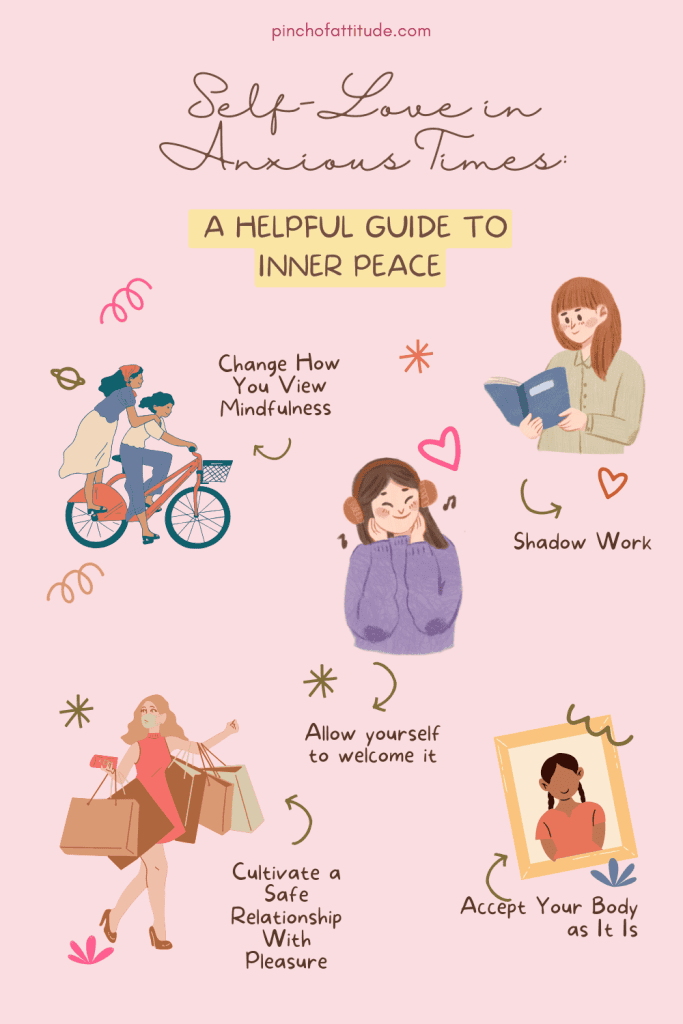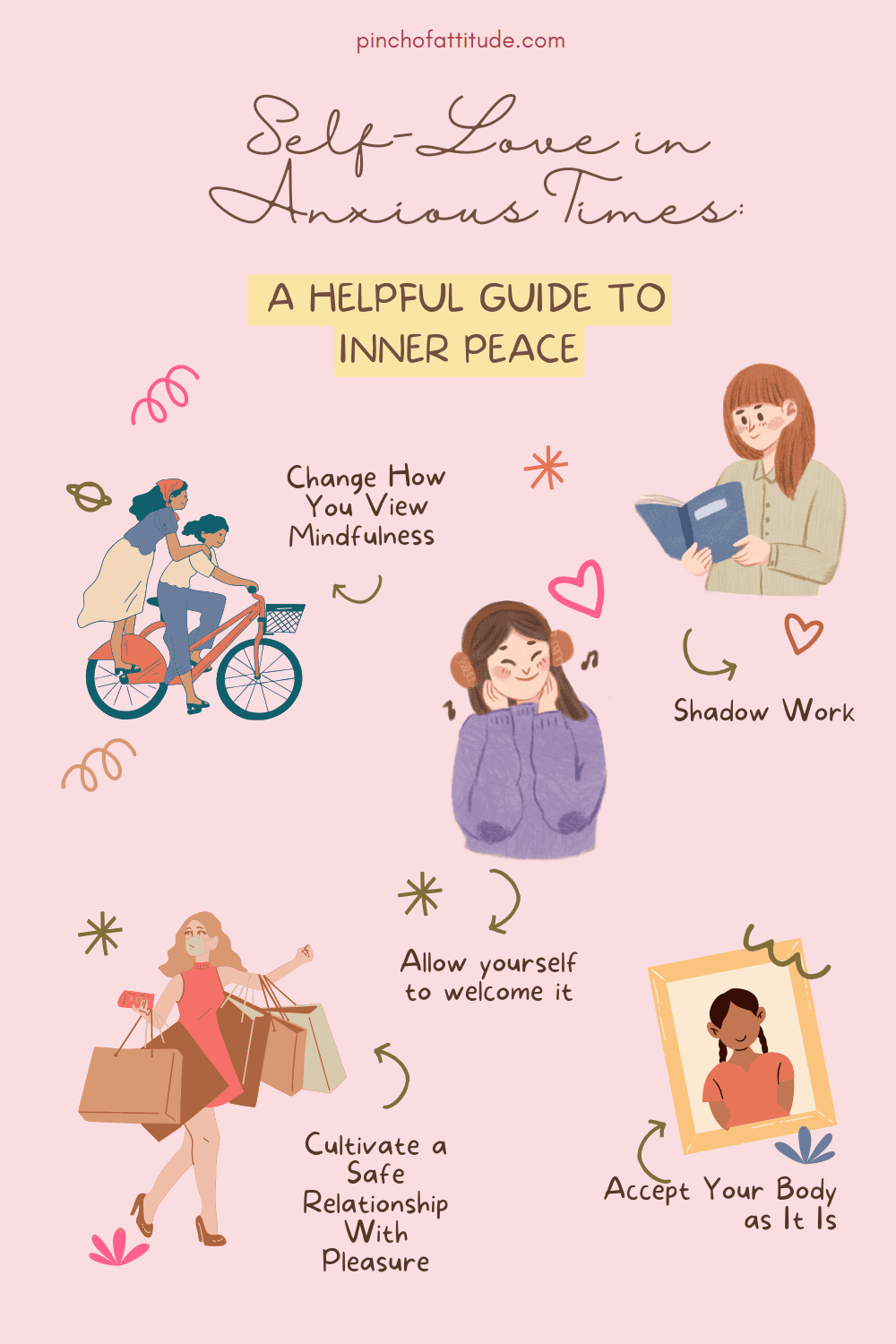While I was never officially diagnosed with clinical anxiety, I have always had a personality inclined towards nervousness, doubt, and fear.
My upbringing didn’t do much to help assuage these neurotic tendencies. I was raised in a strict household that handed me specific guidelines on how I should act, how the world worked, and what I ought to think.
This cemented in my brain that to be loved, I had to win the approval of those around me. I learned to walk on eggshells, trembling and sweating as I trod the thin line between earning love and invoking the disappointment of my authority figures.
There was one time when I was caught misbehaving as a child, and as punishment, my mother told me to go and sit in the corner.
“Don’t move a muscle.”
I took this command quite literally. I sat as still as a statue, hardly daring to breathe as I stared nervously at the house plant in front of me.
My stomach crawled with worms of anxiety, and my chest was lanced with shards of white-hot shame and fear.
If I moved, I felt like terrible things would happen. No, if I so much as blinked well, surely the world would end.
Needless to say, something like self-love wasn’t even on my radar. I was given the impression that not only was it egotistical, but it was also a bit of a moot point.
After all, what nerve did I have thinking I was loveable?
I existed to please others. Period.
It didn’t matter if I was miserable. If anything, suffering meant I was on the right path: a path defined by meekness and self-sacrifice.
And there was nothing more noble than that.
Table of Contents
You Are Not Broken
Unfortunately, my story isn’t all that unique.
Anxiety about our self-worth is instilled in us from a young age. Many of us are told that we are too fat, too thin, too tall, too short, too freckled, too tan, too pale, too quiet, too loud, too opinionated, too docile — in other words, that we are not right as we are.
There’s good news though: we can be fixed! The solution just so happens to be conveniently provided by a variety of systems that claim to have our best interests at heart.
We need the right makeup, spiritual practice, hairstyle, romantic partner, diet, fitness routine — the list goes on and on.
If you are unapologetically yourself, then you are a threat. You are dangerous to all the systems that have invested a lot of time and money into making sure you never feel like you are enough.
But the truth is that we are born into this world as inherently good beings who have a right to be here.
We are enough simply because we are. There is nothing to fix because nothing was ever broken in the first place.
Stepping into this truth takes time and effort. But If we don’t take it, we risk becoming what others want us to be rather than who we really are.
Here are some ways you can get started on cultivating your sense of self-love.
Step 1: Accept Your Body as It Is

When I was younger, I was told that my body was inherently problematic. Not only was it something that should be hidden, but it was also my job to ensure nobody ever looked at it in a way that was remotely objectifying.
This made me critical and unkind, both to myself and others. I became judgmental of what everyone was wearing and how they looked.
Rather than being grateful for my body, I became suspicious of it.
This was a real shame. I missed out on developing an important component of self-love: cherishing the way I am uniquely physically present in this world.
Your body is a gift, not a burden.
It should be allowed to take up space without judgment. We should try loving it as it is, not as we are told it ought to be.
You can start with a simple exercise: stand in front of a mirror and look at yourself naked.
Find a few things that you like about your body and a few things that you don’t. Then consider why you might feel that way.
This exercise will probably feel a bit weird at first but that’s okay.
Pay attention to that feeling too. Loving your body takes work.
In fact, there are still certain parts of my own that I can’t label without experiencing embarrassment or shame.
Exhibit A: I’m a grown woman in my thirties and I still cringe over the word “vagina.” I can barely even say “nipples.”
Truthfully, these terms are no more offensive than saying “elbow” or “knee.” They are simply body parts, and yet they carry a lot of baggage for me, and loving them is an ongoing struggle.
What about you? What determines whether you like or dislike a certain body part?
Is it simply because it doesn’t conform to some arbitrary standard you were given as a child? Is it because you have been told certain parts of your body are ugly or shameful by those who had no right to comment on it in the first place?
When it comes to loving your body, practice stepping into what already is rather than what you think you ought to be based on shiny advertisements, judgmental peer groups, and subjective beauty culture.
Step 2: Cultivate a Safe Relationship With Pleasure
Most of us have a complicated relationship with pleasure. We are often suspicious of it (I was always of the mindset that it was a slippery slope: “If I do x, I won’t be able to control myself from doing y”), or we have a hard time thinking we even deserve it.
Pursuing innocent pleasure for its own sake, and not in service to others or in the name of a greater cause, is something I have had to unlearn over the years. I used to repeatedly deny myself things simply because I felt bad for having them.
Sharp needles of anxiety would claw at my stomach, and I would feel guilty for even enjoying things in the first place. It was okay to have a little bit of wine or a handful of chips as a snack, but too much and I was a “glutton”, “selfish”, or “hedonistic.”
Treating pleasure as the end goal instead of just as a means can be a scary thought.
But the truth is that we are biologically wired to experience pleasure. The human body is a kaleidoscope of sensations, and learning how to mindfully engage with it is one of the greatest gifts we can give ourselves.
Don’t get me wrong: It’s all about balance, and sometimes practicing self-love in the long term means denying yourself something you might want at the moment (such as alcohol or sweets). However, we should all be empowered to discover where this line might be for each of us.
The easiest place to start is by being present with your five senses.
Where are you reading this? Are you sitting or standing?
What do you see? What are you touching?
What smells and sounds are around you?
It might also be helpful to do some reflection on why you might view pleasure through a negative lens.
Were you told you couldn’t trust it? That it was dangerous?
Consider all the different kinds of pleasure that are out there and allow yourself to experience it in a way that feels safe for you.
Sit in the sun for a minute or try a new coffee flavor. Take some time to sit on the couch and do nothing.
It doesn’t have to be anything wild. Just practice permitting yourself to do things you like, for no reason other than that you like it.
Pleasure is your birthright as a human being. Don’t be afraid to claim it.
Learning how to cultivate a safe relationship with pleasure is one of the best ways to love ourselves and enrich our daily lives.
Step 3: Change How You View Mindfulness

Mindfulness reduces the likelihood of us looking to external sources (which are always changing and fickle) for happiness.
I know, I know. You’ve probably heard about the wonders of mindfulness before and you’re sick to death of it.
It’s often associated with meditation (think of a yogi sitting under a waterfall, the very portrait of detached bliss), which is something that sounds daunting to many people.
However, you don’t have to carve out time to sit in silence for several minutes a day if that isn’t your thing. Don’t force yourself to work towards that if you don’t want to.
Sometimes mindfulness can be as simple as speaking a kind word about yourself. You can also start by trying to be more aware of your emotions during the day.
This is called “noting.”
When you wake up in the morning, take stock of how you feel (even if it’s just to note that your lower back hurts and you could use a few more hours of sleep). When you go to bed, check in with yourself again.
Do you feel glad the day is over? Sad?
Are you angry about something that happened? Are you grateful for anything?
If the answer is a resounding no, that’s also okay. The point is to note what is coming up for you at the moment and then release it without judgment.
This might seem overly simplistic, but so many of us walk around on autopilot. We are caught up in a swirl of emotions all day long and we allow ourselves no time to catch our breath.
The practice of noting helps you cultivate a sense of presence. And when you become more present, you begin developing a sense of compassion for both yourself and others.
Step 4: Shadow Work
Become familiar with the parts of yourself that you don’t like. Recognize them for what they truly are: the parts of you that need the most love.
Shadow work isn’t about beating yourself up. It’s about befriending yourself.
When they are led into the light, our monsters become our friends because you can finally see them clearly.
They are not scary things lurking in the dark, waiting to devour you. They are your inner child, your inner critic, and your wounded heart.
They are not something to fix, but something to meet with compassion.
It’s important to purge ourselves of the shadows that can hide within our being like cancerous lumps because if they are ignored, they leave a lingering sense of heaviness that can rob you of joy and fulfillment.
During my shadow work, I’ve noticed a pattern. I’ll resist the shadows for as long as I can until I feel myself splintering inwardly.
When I finally can’t take their insistent prodding anymore, I’ll go out and meet them — albeit reluctantly, and with much grumbling.
Once the shadows are exposed, I have a period where I feel worthless. I shrivel inwardly as I am torched into ash by the searing flames of my shame.
A little snide voice in my head goes off:
“See, this is why you shouldn’t trust yourself. I mean, just look at you. You’re useless.”
Eventually, I force myself to sit with the voice and the shadows I’ve unearthed. Gradually, the heat of shame is cooled by the waters of a grudging acceptance.
Sometimes compassion follows, sometimes it doesn’t.
It’s emotionally taxing work. Shame in particular is hard to eradicate from our inner garden, but it doesn’t have to run the show.
When you replace shame with compassion, shadow work becomes just another way to love yourself.
Fill Your Own Cup
We have a common saying in yoga: ‘You can’t pour from an empty cup.’
In other words, you cannot share what you don’t have. You cannot bestow love and grace on others if you don’t have it within you.
Self-love isn’t about being perfect or complacent with the things you might need to work on.
It’s about giving yourself the care and attention you need so you can show up in life as your highest self. It’s about cultivating inner abundance so that you can, in turn, share it with others.
Self-love is what we all deserve. Allow yourself to welcome it.




